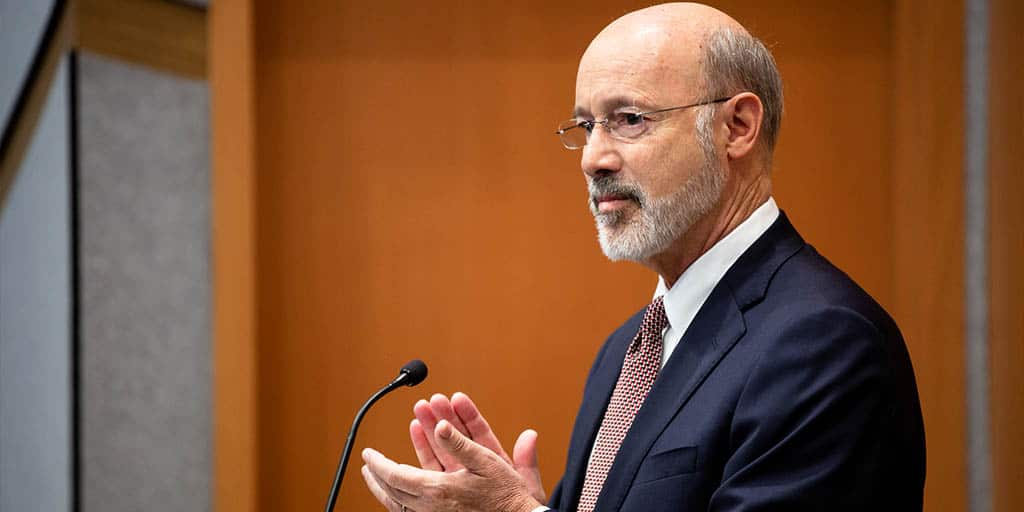 HARRISBURG, Pa. – Governor Tom Wolf was joined recently by Representative Steve McCarter, Senator Steve Santarsiero, Senator Jay Costa, Representative Frank Dermody, Department of Environmental Protection (DEP) Secretary Patrick McDonnell, Department of Conservation and Natural Resources Secretary Cindy Adams Dunn, and members of the Climate Caucus to announce Pennsylvania’s membership in the U.S. Climate Alliance and release the state’s new climate action plan.
HARRISBURG, Pa. – Governor Tom Wolf was joined recently by Representative Steve McCarter, Senator Steve Santarsiero, Senator Jay Costa, Representative Frank Dermody, Department of Environmental Protection (DEP) Secretary Patrick McDonnell, Department of Conservation and Natural Resources Secretary Cindy Adams Dunn, and members of the Climate Caucus to announce Pennsylvania’s membership in the U.S. Climate Alliance and release the state’s new climate action plan.
“We’ve seen lately even more evidence that there is a need for leadership on climate change. For that reason, Pennsylvania will join the U.S. Climate Alliance, a bipartisan coalition of 24 governors, representing over half of the U.S. population to work to implement policies that uphold the commitments our nation made in the Paris Agreement,” said Governor Wolf.
“With the federal government turning its back on science and the environment, I am proud to join with states that are leading the way towards new climate solutions, and taking concrete actions to reduce greenhouse gas emissions. States like Pennsylvania must take action to reduce greenhouse gas emissions and protect our communities, economies, infrastructures, and environments from the risks of a warming climate.”
The United States Climate Alliance is a bipartisan coalition of governors committed to reducing greenhouse gas emissions. Led by state governments, the alliance facilitates state cooperation to accelerate the deployment of climate solutions to help each state achieve its climate goals.
“I applaud the efforts of the governor and his administration to address the impacts of climate change in the commonwealth head on,” said Rep. McCarter. “The Pennsylvania Climate Caucus stands ready to help in any way to advance policy and legislation to meet what is surely humanity’s greatest challenge here in Pennsylvania and across the globe.”
“When future generations of Pennsylvanians look back at this critical moment in history, I want them to know they were not abandoned,” Sen. Santarsiero said. “Entering into the U.S. Climate Alliance and implementing the Climate Action Plan sends a clear message that Pennsylvania is serious about addressing climate change.”
In January 2019, Governor Wolf signed an executive order to set Pennsylvania’s first statewide climate goals, aiming to reduce greenhouse gas emissions by 26 percent by 2025 and 80 percent by 2050, compared with 2005 levels. The executive order also established the Green Government Council to ensure that state government offices lead by example to help achieve these goals.
The Pennsylvania Climate Action Plan 2018 is the new state climate plan developed by DEP and state agency partners with recommendations for government leaders, businesses, and citizens to reduce greenhouse gas emissions and adapt to a changing climate.
The plan describes over 100 actions, 15 of which DEP and partners analyzed quantitatively for potential greenhouse gas emissions reduction. The analysis showed that just those 15 actions, such as increasing renewable energy, incentivizing energy efficient buildings, and increasing the use of electric vehicles, would reduce emissions 21 percent by 2025. Any combination of the 85 additional actions would likely achieve even more emissions reductions.
“Perhaps the biggest recommendation of the Climate Action Plan is that a team effort is needed to reduce greenhouse gas emissions in Pennsylvania,” said DEP Secretary Patrick McDonnell. “Government leaders must lead by example, and businesses, farms, community organizations, and citizens can all make a difference to fight climate change.”
“Trees and forests play an important role absorbing carbon dioxide and reducing greenhouse gas emissions,” DCNR Secretary Cindy Adams Dunn said. “We’re leading the way to a more resilient and sustainable Pennsylvania by managing forests in new ways, reforesting abandoned mine lands, and planting stream buffers to increase carbon storage.”
While the plan does have a number of supporters behind it, there are also those standing in opposition, including State Sen. Gene Yaw (R-23), Chairman of the Senate Environmental Resources and Energy Committee, who issued the following statement:
“While the Action Plan released today includes many sweeping new recommendations, we need to be pragmatic. Markets move and markets fluctuate, and I believe Pennsylvania is at the forefront of clean energy technology that is already reducing greenhouse gas emissions across the board. Reports have indicated that emissions levels are at their lowest levels since 1992. I don’t believe that mandating nearly 90% of Pennsylvania’s competitive energy market or more is a step in the right direction. The plan released today does not clearly define any benefits to be achieved and delivered to the citizens of Pennsylvania if these recommendations are implemented. Further, the plan does not come close to meeting the reductions the Department says are necessary if adopted.”
Pennsylvania Climate Action Plan 2018 marks 10 years since state law first required the DEP to develop a climate plan and periodic updates. It’s the third update to the first plan, which was published in 2009.
The Climate Caucus is a bipartisan discussion forum for legislators from both chambers and both sides of the aisle to address all manner of issues relating to climate change in Pennsylvania, including jobs, industry, manufacturing, clean air, clean water, specific regional impacts, and others.
For more information on the Pennsylvania Climate Action Plan 2018, visit DEP.pa.gov/Climate.
Copyright © 2024 EYT Media Group, Inc. All rights reserved. Any copying, redistribution or retransmission of the contents of this service without the express written consent of EYT Media Group, Inc. is expressly prohibited.








